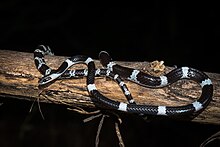| Blanford's bridle snake | |
|---|---|

| |
| from Kaeng Krachan National Park | |
| Conservation status | |
 Least Concern (IUCN 3.1) | |
| Scientific classification | |
| Domain: | Eukaryota |
| Kingdom: | Animalia |
| Phylum: | Chordata |
| Class: | Reptilia |
| Order: | Squamata |
| Suborder: | Serpentes |
| Family: | Colubridae |
| Genus: | Lycodon |
| Species: | L. davisonii |
| Binomial name | |
| Lycodon davisonii (Blanford, 1878) | |
| Synonyms | |
| |
Blanford's bridle snake (Lycodon davisonii), also known commonly as Blanford's bridal snake, is a species of harmless snake in the family Colubridae. The species is endemic to Asia. Blanford's bridle snake is so named because its slim body resembles the bridle used to control horses.
Geographic range
L. davisonii is found in Cambodia, southern China, Laos, Myanmar, Thailand, and Vietnam.
Etymology
The specific name, davisonii, is in honor of British ornithologist William Ruxton Davison.
Habitat
The preferred natural habitat of L. davisonii is forest, at altitudes from sea level to 1,500 m (4,900 ft).
Behavior
L. davisonii is terrestrial, semiarboreal, and nocturnal.
Diet
L. davisonii preys upon geckos and other small vertebrates.
Reproduction
L. davisonii is oviparous.
References
- ^ Thy, N.; Nguyen, T.Q.; Chan-Ard, T.; Golynsky, E. (2012). "Lycodon davisonii ". IUCN Red List of Threatened Species. 2012: e.T183193A1732700. doi:10.2305/IUCN.UK.2012-1.RLTS.T183193A1732700.en. Retrieved 20 November 2021.
- "Dryocalamus davisonii ". Animal Diversity Web. Retrieved 4 May 2014.
- ^ "Dryocalamus davisonii BLANFORD 1878". ubio.org. Retrieved 4 May 2014.
- ^ Lycodon davisonii at the Reptarium.cz Reptile Database
- ^ Beolens, Bo; Watkins, Michael; Grayson, Michael (2011). The Eponym Dictionary of Reptiles. Baltimore: Johns Hopkins University Press. xiii + 296 pp. ISBN 978-1-4214-0135-5. (Dryocalamus davisonii, p. 66).
Further reading
- Blanford WT (1878). "Notes on some Reptilia from the Himalayas and Burma". Journal of the Asiatic Society of Bengal 47 (2): 125–131. (Ulupe davisoni, new species, pp. 129–130). (in Latin and English).
- Boulenger GA (1890). The Fauna of British India, Including Ceylon and Burma. Reptilia and Batrachia. London: Secretary of State for India in Council. (Taylor and Francis, printers). xviii + 541 pp. (Hydrophobus davisonii, new combination, p. 299).
- Boulenger GA (1893). Catalogue of the Snakes in the British Museum (Natural History). Volume I. Containing the Families ... Colubridæ Aglyphæ, part. London: Trustees of the British Museum (Natural History). (Taylor and Francis, printers). xiii + 448 pp. + Plates I-XXVIII. (Dryocalamus davisonii, new combination, p. 372).
- Smith MA (1943). The Fauna of British India, Ceylon and Burma, Including the Whole of the Indo-Chinese Sub-region. Reptilia and Amphibia. Vol. III.—Serpentes. London: Secretary of State for India. (Taylor and Francis, printers). xii + 583 pp. (Dryocalamus davisoni, pp. 274–275).
External links
| Taxon identifiers | |
|---|---|
| Dryocalamus davisonii | |
This article relating to Colubrinae is a stub. You can help Misplaced Pages by expanding it. |